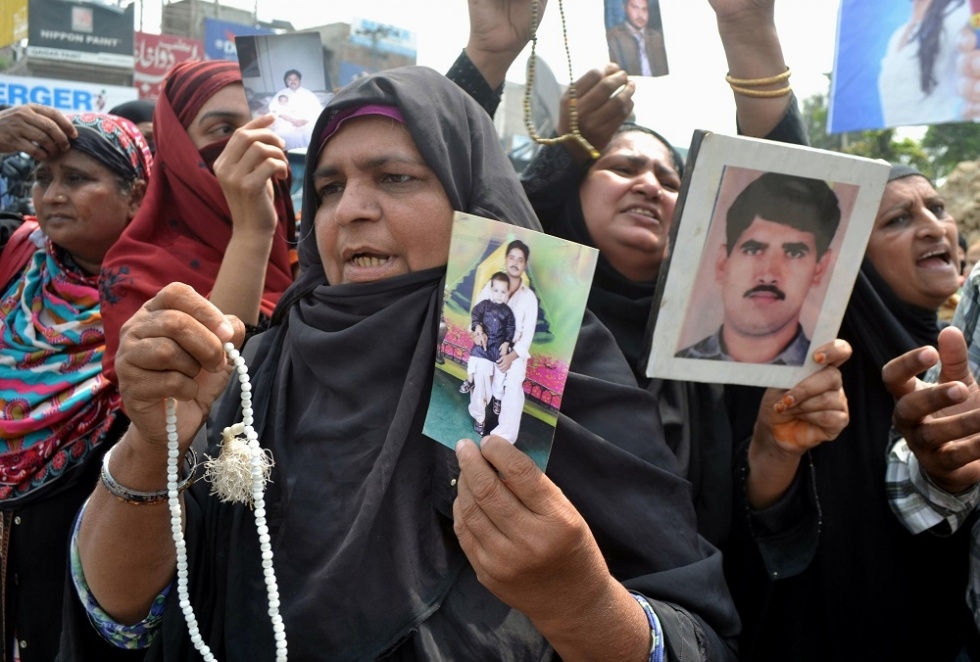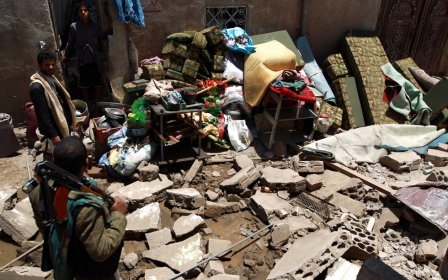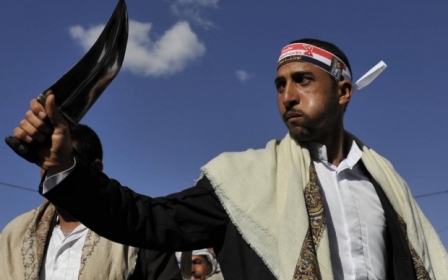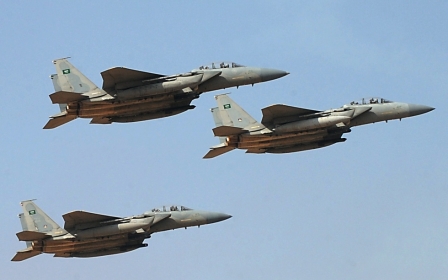ANALYSIS: Pakistan struggles with Yemen coalition dilemma

Pakistan’s Defence Minister travelled to Riyadh on Wednesday to meet with top Saudi officials about the ongoing Saudi-led aerial bombardment campaign in Yemen.
Khawaja Muhammad Asif met with Prince Mohammed bin Salman bin Abdulaziz, as well as a number of other civil and military officials, Saudi press reported.
No other news has yet been released about the meeting, although Pakistani authorities have denied reports that they had joined the Saudi-led military operation to roll back the advance of the Houthi militias and reinstate President Hadi who fled to Saudi Arabia late last month.
According to local daily the Express Tribune, Pakistan's foreign office spokesperson Tasnim Aslam on Wednesday said that the reports - which began appearing in Pakistani press earlier this week were, "speculative, misleading and incorrect".
Pakistan is left facing an unenviable dilemma - whether to join a Saudi Arabia-led coalition fighting Shiite Huthi rebels in Yemen or stay out and risk angering its old ally which provides it with huge financial support.
Pakistan, currently the Islamic world's only nuclear power, has provided military aid and expertise to the Gulf kingdom for decades and enjoyed cheap oil and massive financial help in return.
Close ties to Saudis
In addition, Prime Minister Nawaz Sharif has close personal ties to the Saudi royal family, so Pakistan might have seemed like an obvious candidate to join the coalition of Arab states.
But the government has held back, in part because it finds itself torn between its old ally and its neighbour, Iran, the major Shiite power, which is furious at the Yemen assault.
Foreign Secretary Aizaz Ahmad Chaudhry also stressed on Wednesday that the evacuation of stranded Pakistanis from Yemen was the government's top priority, although was careful to note that Pakistan had great "respect" for Saudi Arabia and their long-lasting ties.
In an interview with Radio Pakistan's Current Affairs Channel, he said that Prime Minister Nawaz Sharif was supervising the whole rescue process. “Our naval ship will reach Aden on Thursday to bring back stranded Pakistanis while China's naval ship was also reaching Aden."
Islamabad has previously said that it will defend Saudi "territorial integrity" but insists no troops or equipment have been sent.
The coalition fight to end the Houthi rebels' uprising against President Abd Rabbuh Mansour Hadi has sent tensions between the Sunni Arab coalition and Shiite Iran soaring.
Sectarian violence has soared in largely Sunni Pakistan in recent years, most of it targeting Shiites, who make up 20 percent of the population. According to Channel News Asia, 50,000 Pakistanis have died as a result of sectarian violence in recent decades.
Abdullah Khan, director of the Conflict Monitoring Centre told the channel: “The basic conflict is not a sectarian one. But unfortunately, we Muslims are very prone to such kind of divides and polarisation.”
“So now it has become a sectarian conflict encompassing the whole region. It will dent Pakistan’s unity and Pakistan’s society to a large extent in the coming days.”
Jamshed Ayaz, a former director of Pakistan's Inter Services Intelligence also stressed that the country must do whatever it can to avoid an escalation.
“This war is a very dangerous war. It can spread very badly. I think we should try to avoid it,” he told Channel News Asia.
Umair Javed, an analyst and writer, similarly warned that any intervention could sharpen internal divisions.
"Even though this conflict isn't overtly sectarian it might be presented as sectarian within Pakistan - groups that are hostile to Iran and to Shiites in Pakistan will present it as a conflict between Sunnis and Shiites," he told AFP.
Blood and money
Military ties between the two countries date back to the 1960s, when Pakistan helped Riyadh build up its air force and supplied pilots to fly sorties against a South Yemeni incursion into the kingdom in 1969, US security expert and former CIA officer Bruce Riedel wrote in a Brookings Institution article.
In the 1980s Riyadh, along with the US, funnelled vast sums of money through Pakistan to fund the Afghan mujahideen's fight against Soviet occupation.
Cooperation and financial assistance has continued to flow from Riyadh, in the form of cheap oil and loans, including one of $1.5bn last year.
When Sharif was ousted in a military coup in 1999, it was Saudi Arabia that received him in exile.
These ties have prompted some within Saudi to push for an intervention, regardless of the risks.
“If the Pakistan army is working throughout the world to counter terrorism, then it should also come to the help of Saudi Arabia and crush the terrorists (in Yemen),” Ateeq-ur-Rehman Shah, a member of the Jamiat ahl-e-Hadith political party told Channel News Asia.
But despite this history, there has been considerable resistance in Pakistani media this week to joining what is seen by many as a "foreign" war, with a bitter fight against militants still raging in northern parts of the country.
Army stretched already
The military is busy with a major operation against Pakistani Taliban hideouts in the tribal northwest, on top of maintaining a heavy presence along the border with arch-foe India, and some argue its resources are too stretched to contribute in Yemen.
"Nawaz Sharif knows the military is totally tied up, a third of its strength is tied up in FATA (the tribal northwest). Pakistan is not in a position to make any troop contribution," Rifaat Hussain, a leading Pakistani analyst and university professor, told AFP.
Moreover the military is likely to be wary about committing troops to any future ground operations in Yemen, which would likely be messy and difficult.
"Pakistan is very aware it is a tribal war, a tribal conflict, even though it has taken on a Sunni-Shia aspect and we don't want to muddy the waters by getting into this conflict unthinkingly," Hussain said.
The government has dispatched a high-level delegation to Riyadh to assess the situation, but it is not clear how quickly this might produce a decision from Islamabad on joining the Saudi coalition.
Pakistan will be reluctant to anger Iran, given Tehran's history of supporting proxy militant forces around the region.
But faced with a struggling economy and energy crisis, Pakistan will also find it hard to say no to the Saudis.
It is not clear what consequences an outright refusal would bring for Pakistan, though Saudi might consider cutting back on aid and the cut-price oil it provides.
Islamabad's hand could be forced by the threat of Saudi sanctions, "given the reliance on Saudi foreign exchange (and) oil reserves," according to analyst Javed.
Security analyst Talat Masood said last week that Islamabad probably "doesn't have the luxury of refusing" Riyadh's request definitively.
New MEE newsletter: Jerusalem Dispatch
Sign up to get the latest insights and analysis on Israel-Palestine, alongside Turkey Unpacked and other MEE newsletters
Middle East Eye delivers independent and unrivalled coverage and analysis of the Middle East, North Africa and beyond. To learn more about republishing this content and the associated fees, please fill out this form. More about MEE can be found here.




